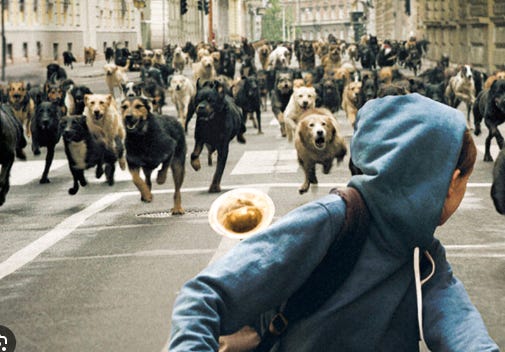Dear Reader,
Hello. This is a re-post of a film review I wrote in 2015 but it's been on my mind lately, perhaps because it feels that politically we are devolving and descending, with frightening right-wing rhetoric growing globally and with fascism seeming to make a comeback, (did it ever really go away?). This was originally featured in digital newspaper The London Economic.
In terms of animal cruelty please note the following (there is more exploration of this issue via Roger Ebert - who I quote below - here):
"White God opens with an unusual disclaimer: ‘All of the untrained dogs who perform in this film were rescued from the streets or shelters and placed in homes with help from an adoption program.’ This is a startling upgrade from the animal-related text we are used to: ‘No animals were harmed during the making of this film.’ But for White God, it is both a necessary disclaimer and a statement of purpose. The film features countless scenes of animal suffering that, without this reassurance, would cause serious concern among viewers sensitive to animal cruelty.”
Thank you for reading,
love,
Emma
x o x o
p.s. talking of animals did you know I wrote a book - in part - about farmed (so-called food) ones? You can purchase it - Roaming Wild, the Founding of Compassion in World Farming - here.
Kornel Mundruczo’s feature White God can’t really be done justice in conversation, as I’ve realised this week raving to friends about a film that follows an army of dogs as they take over a Hungarian city! White God is many things depending on your view point, an animal rights film, a comment on the current political situation in Hungary; one that is easily extrapolated to other parts of the world, (the Jobbik party is not unlike UKIP in its anti-European, neo-fascist and homophobic standpoint), a thriller, a coming-of-age tale, and an old testament-style vengeance fable.
Zsófia Psotta is brilliant, both vulnerable and feisty, as teenage lead Lili. Up rooted from her mother and sent to live with her authoritarian, distant yet not wholly unlikeable father (Sandor Zsoster). She is unsurprisingly lonely and Hagen (Bodie) her dog absolutely fills that positive dog cliché of being the best and most loyal friend she could ever have. The fact that the only ‘I love you’ in the film comes from Lilli and is spoken to Hagen says a lot. (In the context of Lilli’s life: at the film's start her mother says goodbye to her thirteen-year-old daughter - she is off to the other side of the world for three months - she tells Lilli to ‘take care’ and to ‘obey her father’, and that’s it.)
However, thanks to an absurd, eugenics-inspired law Hagen and Lilli’s bond is soon torn apart. This law states that owners of half-breed dogs have to pay a tax, which of course ‘pure Hungarian’ dog-breeds are not subject to - Lilli’s father is unwilling to pay this fee. (This law actually went to motion in Hungary but was not passed.) The political metaphor here is clear however the gripping plot, beautiful cinematography, and emotional sensitivity expressed means that the film is never too heavily weighed down with ideology.
Following Hagen’s expulsion from Lilli’s life things go from bad to worse, as he is abused and exploited by a succession of humans from all levels of society, from the authorities in the form of the pound, to a homeless man, to a dog-fight trainer. Rather satisfyingly about halfway through sweet Hagen reaches breaking point and thus his uprising begins. There are obvious Planet of the Apes parallels here but this is a darker, distinctly non-Hollywood depiction of another species murderous insurgency - and this is where the Old Testament eye for an eye vengeance comes in. To mix religious analogies this is about karma not mindless violence and it is the abusers who are attacked. And it might just be my vegan sensibility but I definitely found myself siding with the dogs, even when their revenge does turn brutal. Though I doubt I’m alone in this sentiment as much of the film is viewed from a dogs-eye level, encouraging empathy with the animals and with what they represent - the view point of the segregated and exploited minority. Highly recommended viewing.
You can watch White God on the BFI Player here, which also has a cool Mark Kermode intro, as well as on (subscription) streaming platform Mubi here.





Thank you for writing about White God. I've always wanted to watch it but afraid to do so. Maybe, one day, I will make a point of watching it.
This movie doesn't get enough love. Thanks for sharing!